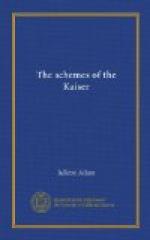How well I remember the friendly abandon of Louis Bamberger in our midst! Truly these Prussian Liberals and ourselves held the same opinions concerning everything, far or near, which bore upon intellectual independence, upon progress and civilisation. And since we were united by such a complete understanding, such identity of ideas, it was our duty to work together: our German friends for the triumph of liberalism in France, and we, for the triumph of liberalism in Germany. As to such questions as those of territorial frontiers, or the banks of the Rhine, Bamberger used to ask, “Who thinks of such things in Germany? No one! They had other things to think about!” The heart’s desire of the sons of the German revolution of 1848-49 was a universal republic, universal brotherhood, and nothing else. We believed him, but for what an awakening! Hardly were the Germans in France, than all the orders dictated by Bismarck were translated into French by Louis Bamberger.
A book by Dr. Hans Blum, which has just been published in Berlin under the title of “The German Revolution of 1848-1849,” throws even more light on the “brotherly” sentiments of German republicans. In this book Dr. Blum recalls a speech made in the Palatinate on May 27, 1832. This is what the orator said: “There can only be one opinion amongst Germans, and only one voice, to proclaim that, on our side, we would not accept liberty as the price of giving the left bank of the Rhine to France. Should France show a desire to seize even an inch of German territory, all internal dissensions would cease at once and all Germany would rise to demand the retrocession of Alsace-Lorraine, for the deliverance of our country.”
That is how German Republicans thought, as far back as 1832. In 1868-69 they made us swallow once again ideas of brotherhood from beyond the Rhine, by lulling our perspicacity, by enervating the courage we used to display towards foreigners, and it was several weeks before we realised in 1870 that all Germany, from one end to the other, was of the same type of honesty, the same character as the Ems telegram.
We are nothing but fools, credulous fools, if we believe that any German can think otherwise than as a member of united, that is to say Prussianised, Germany, or if we imagine that Prussia is anything but the complete, total, unique, fully accepted, assimilated and admired expression of German patriotism. Prussia is the fine flower, the ripe fruit of German unity. A few Bavarians, a few so-called German liberals, may pretend to be restive under the despotism of the King of Prussia, but they accept unreservedly the authority of the German Emperor. And what is more, it is just as he is, that they wish their Emperor to be, thus they have imagined, thus they have made him. He is like unto them in their own image, he governs them according to their own mind. There may be some who, as a matter of personal inclination, might prefer to have more liberalism, but whenever Germanism is in question it is personified in William II, King of Prussia. Berlin is the capital of all the Germans upon earth.




